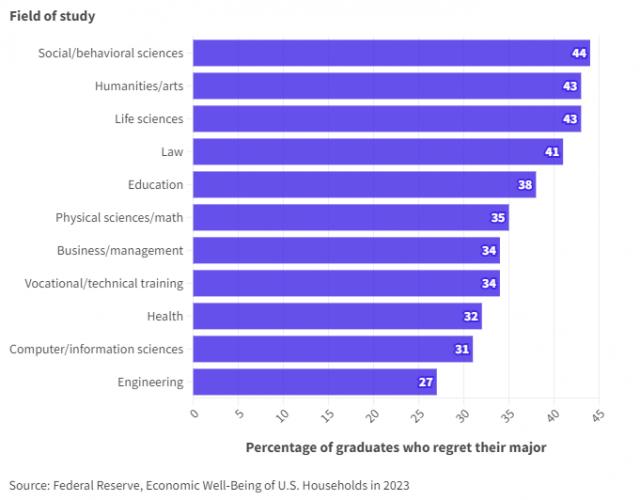Regret and Reward: The College Majors Graduates Wish They Hadn’t Chosen

When it comes to choosing a college major, many graduates find themselves looking back with regret. According to a recent report by the Federal Reserve titled Economic Well-Being of U.S. Households in 2023, over 40% of graduates in fields like humanities, social sciences, life sciences, and law express regret about their chosen majors. The survey, which captures the perspectives of over 11,000 adults, offers a window into the perceived return on investment in higher education and the complex calculus of satisfaction versus financial gain.
The most-regretted majors, according to the survey, include social and behavioral sciences (44% of graduates), humanities and arts (43%), life sciences (43%), law (41%), and education (38%). Meanwhile, fields like engineering (27% regret), computer and information sciences (31%), and health (32%) rank as the least regretted. Overall, 35% of all college graduates say they would pick a different major if given the chance.
Interestingly, the report suggests that while many graduates might regret their specific field of study, most do not regret their decision to attend college altogether. Over 80% of those with bachelor’s degrees feel that their education was a valuable stepping stone to a well-paying job. However, these feelings vary significantly by age and degree level. For instance, only 20% of millennials with some college or a technical degree feel the benefits outweigh the costs, while 55% of those with bachelor’s degrees and 66% of those with advanced degrees believe the benefits exceed the costs. Among older Americans, satisfaction is even higher, with 75% of bachelor’s recipients and 86% of advanced degree holders deeming their education worthwhile.
The rising cost of college plays a significant role in this evaluation. The average cost of a year of college in the U.S. now stands at $38,270, a figure that has doubled since 2000, according to the Education Data Initiative. Combined with a growing student debt burden—nearly $1.8 trillion owed by Americans, averaging over $40,000 per borrower—many graduates are left questioning whether their degrees were worth the investment.
Not surprisingly, the least-regretted majors tend to align with fields offering strong salaries. For example, electrical engineers earn an average annual wage of $117,680, software developers make $138,110, and nurse practitioners earn $128,490. On the other hand, humanities degrees, which have been declining, often do not correlate directly to specific high-paying jobs, with art and design workers averaging $65,190 and kindergarten teachers earning around $67,790.
This divergence in satisfaction reflects broader trends in higher education. While degrees in science, technology, engineering, and math (STEM) have been steadily rising, fields like the humanities are in decline. Federal data shows that the number of humanities degrees dropped from a peak of 236,826 in 2012 to 179,272 in 2022, a trend mirrored in education degrees as well. Meanwhile, efforts to promote STEM fields, such as those initiated by former President Barack Obama, continue to gain traction.
Yet, graduates who chose health-related fields or engineering programs seem more content. Jerome Lynch, dean of Duke University’s Pratt School of Engineering, notes the enthusiasm of new students and the opportunities available to graduates. This contrasts with fields like journalism, which has seen significant declines in satisfaction, with 87% of journalism graduates reporting regret in a recent survey.
The Federal Reserve’s survey, which began in 2013, reveals that perceptions of the return on investment in various fields have fluctuated over time. For example, in earlier surveys, even computer science—now among the least-regretted fields—was once viewed less favorably. While the methodologies have evolved, the trend toward favoring majors with clearer financial returns is evident.
Today, business remains the most popular major in America, with nearly 375,000 bachelor’s degrees awarded in 2022, followed by health professions, social sciences and history, biological and biomedical sciences, and psychology. With ongoing debates about the value of a college education and the costs involved, the landscape of higher education continues to shift, shaped by graduates’ changing perceptions of what makes a degree “worth it.”
Origin Article: https://www.usatoday.com/story/money/2024/08/29/most-regretted-college-majors/74908310007/


